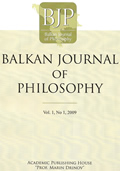Martin Heidegger and Jan Patočka: Two Conflicting Paradigms on a Phenomenological Genealogy of Europe
Martin Heidegger and Jan Patočka: Two Conflicting Paradigms on a Phenomenological Genealogy of Europe
Author(s): Golfo MagginiSubject(s): Philosophy, History of Philosophy, Philosophical Traditions, Metaphysics, Social Philosophy, Ancient Philosphy, Phenomenology
Published by: Институт по философия и социология при БАН
Keywords: Martin Heidegger; Jan Patočka; Europe; Greece; Rome; metaphysics; humanism; care for the soul; modern technology; negative Platonism; historical life-worlds
Summary/Abstract: This paper explores two different, even opposite, genealogies of Europe in contemporary phenomenology by Martin Heidegger and Jan Patočka. On the one hand, the paper focuses upon Heidegger’s 1936 lecture on “Europe and German Philosophy”, which is one of his lesser-known texts. In light of this reading, the paper examines a series of key commentaries by Éliane Escoubas, Franco Volpi, Franco Chiereghin, and Reiner Schürmann. On the other hand, the later Jan Patočka’s discourse on Europe lies upon utterly different hermeneutic premisses, construing a new humanism and renewing the metaphysical tradition in the form of negative Platonism. It concludes by arguing that the major differences between Heidegger’s and Patočka’s phenomenological genealogies of Europe are, first, their different stances toward Western metaphysics and humanism, and, second, their divergent understandings of historical life-worlds.
Journal: Balkan Journal of Philosophy
- Issue Year: VIII/2016
- Issue No: 2
- Page Range: 123-134
- Page Count: 12
- Language: English

